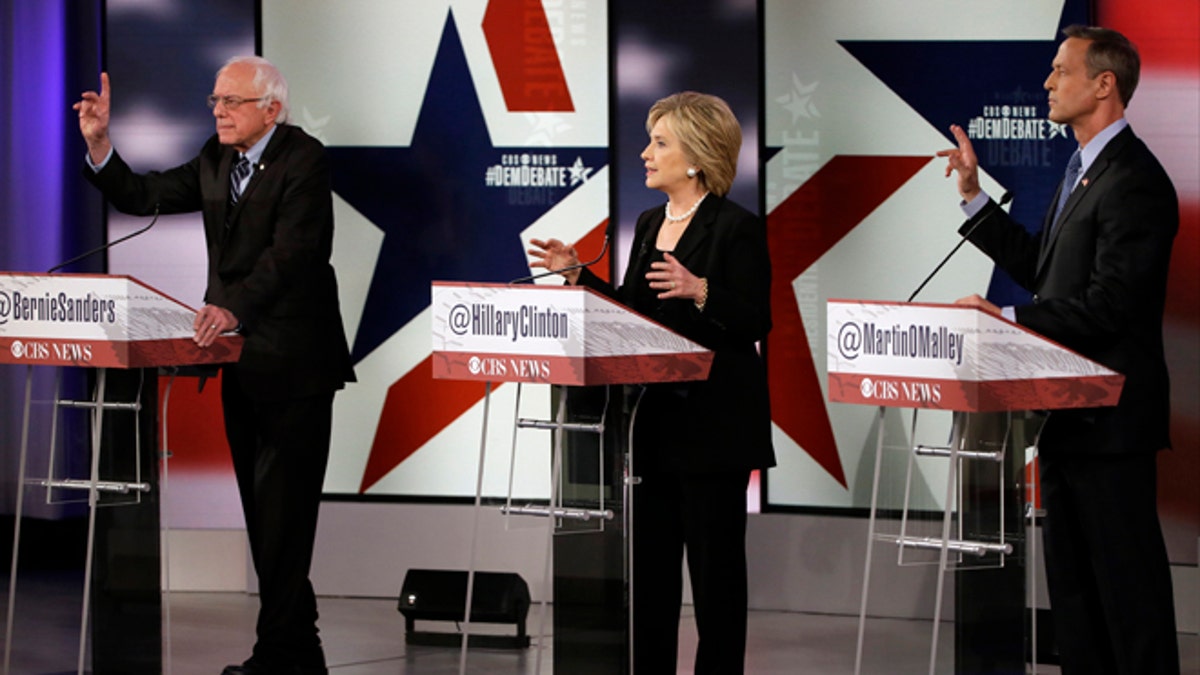
Democratic presidential candidates Bernie Sanders, left, Hillary Rodham Clinton and Martin O'Malley participate in a Democratic presidential primary debate, Saturday, Nov. 14, 2015, in Des Moines, Iowa. (AP Photo/Charlie Neibergall)
While foreign policy and combating ISIS took center stage on Saturday night in the wake of the deadly Paris terror attacks, the second Democratic debate also saw the remaining three candidates spar over domestic issues such as immigration, minimum wage and Wall Street banking practices.
Former Maryland Gov. Martin O'Malley, who has been overshadowed in the Democratic presidential race by former Secretary of State Hillary Clinton and Vermont Sen. Bernie Sanders, had a standout moment early on by going after Republican frontrunner Donald Trump.
"The fact of the matter is, let's say it in our debate because you'll never hear this from that immigrant-bashing carnival-barker Donald Trump. The truth of the matter is, net immigration from Mexico last year was zero," O'Malley said.
He added: "If we want wages to go up, we have to get 11 million of our neighbors out of the off-the-books shadow economy and into the full light of the American economy."
O'Malley, who is significantly trailing both Clinton and Sanders in the polls, also said that Democrats don't need to compromise with Republicans on putting border security before immigration reform.
"If more and more deportations were going to bring our Republican brothers and sisters to the table, it would have happened a long time ago," he said. "We must protect our borders, but there is no substitute for comprehensive immigration reform with a pathway to citizenship."
Clinton, who served as secretary of state under President Barack Obama, defended her former boss' executive action on immigration – saying that her reading of the law and the constitution convinced her that the president has the authority to take action on immigration. The Obama administration is currently appealing to the U.S. Supreme Court some legal setbacks in his attempt to create a temporary pathway to citizenship for millions of undocumented immigrants.
Clinton added that the country should move toward comprehensive immigration reform in steps.
The domestic issues created a good deal of back-and-forth between the candidates, but the debate in Iowa started on a somber mood with a moment of silence for France following the terror attacks that killed at least 129 and wounded at least 352 people.
On foreign policy, Clinton cast herself as the strongest U.S. commander in chief in an uncertain world, even as she found herself forced to defend the Obama administration's response to the rise of the Islamic State militants.
"This election is not only about electing a president, it's also about choosing our next commander in chief," said Clinton. "All of the other issues we want to deal with depend upon us being secure and strong."
But she nearly immediately faced criticism of her own record, when Sanders traced the current instability in the Middle East to the Senate vote — including Clinton's — to authorize military action in Iraq in 2002. He said that U.S. invasion "unraveled the region."
Clinton fought back, saying terrorism has been erupting for decades, specifically mentioning the Sept. 11, 2001, attacks. She said the recent unrest in Libya and other parts of the Middle East was symptomatic of an "arc of instability from North Africa to Afghanistan."
She rejected the idea that she and the rest of the administration underestimated the growing threat of the Islamic State.
On international terrorism, much in the world's mind after the Paris attacks, the early back-and-forth revealed a foreign policy split within the Democratic Party, with Sanders playing to the anti-war activists who boosted then-Illinois Sen. Obama to victory in 2008.
Sanders argued for a far more hands-off approach, advocating for Muslim countries to lead the fight and arguing that the war against Islamic State militants is about the "soul of Islam."
Clinton has a history of advocating for more robust involvement across the globe — both as a presidential candidate eight years ago and as Barack Obama's secretary of state. In recent weeks, she has advocated for a more aggressive U.S. role in the Syrian conflict, calling for a no-fly zone over the area, a move the Obama administration opposes. But she stood by her opposition to seeking a formal declaration of war against the Islamic State.
The Associated Press contributed to this report.












































